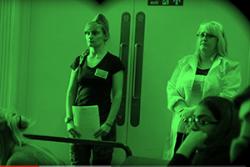How тgamificationт is engaging students in learning
Imagine sitting in your University lecture, when one of your fellow students тdragged outт of a lecture by masked militia-men because they have become тinfectedт, that was the scenario played out during a тgamifiedт psychology module at ЯуИлСљКЯВЪЙвХЦзЪСЯ recently.
Gamificationт is when non-game activities are designed to be like a game.
Dr Rebecca Sharp, who has devised the module, believes it to be the only course at any university to involve extensive use of тgamificationт. If early results are correct, itтs not only engaging the students, itтs also helping them gain a deeper understanding of Behaviour Analysis, the moduleтs topic.
The second year Psychology students had their interest piqued by an introductory email with all the trappings of a military email. The email set the scene by explaining that a viral infection had reached North Wales, and they must report to the base for their first briefing (or lecture).
A keen amateur dramatist, тgame playerт and follower of fantasy and dystopian fiction, Rebecca has woven a dystopian narrative involving a viral infection through all aspects of the module. Every aspect has been woven into the storyline in some way. Learning tasks are set as тmissionsт which can lead to a range of тrewardsт according to the points or task. The students even experience actors playing military and medical personnel during lectures to provide an immersive experience.
As Rebecca explains:
 тThe rewards, though small in themselves, make students feel that they have a control over their learning.т
тThe rewards, though small in themselves, make students feel that they have a control over their learning.т
тThe students are learning exactly the same material as last yearтs students, but taking part in the тgameт and exerting some choices, such as being able to select the topic of the last lecture, select an assignment topic and have sight of one exam subject, makes them feel more engaged. Lecture attendance is high and the students are тreplayingт online tasks over and again until they win maximum points for answering all the questions correctly. When it comes to exams, they should cruise through as these students have been mastering this complex topic throughout the term.т
Sam Webb, 20, from Oxfordshire in England, studying Psychology with Neuropsychology said:
тAt the first lecture we were scanned in as if being screened for infection, told to remain silent by people dressed up soldiers, and the room was kitted out in camouflage. It was incredible. I was impressed by how well the dystopian theme was though-out, all-encompassing and well related to module content, it was not just used as a gimmick, it was directly related and a valuable part of the module.
It is not what I expected from university, with other lectures they are engaging in an academic way, grabbing my academic and research interests...however this module applies to me on a human level, it piques my human interests of survival, competition and comradery. So it is not what I expected, it is much better.т
19 year old Lycee Ruparell from Florida, via London, is studying Psychology said:
"The gamification of the behavioural module has been a thrilling and engaging change from normal lecture routine. It encourages students to really get head-on involved in the content. The challenges it produces for the two teams inspires me to really focus on getting the content down, and in turn makes learning extremely effective as well as making it feel less tedious than revision and learning can sometimes be. It was a surprising tactic if I'm honest, I certainly didn't expect to come back from the summer break and be plunged into a post-apocalyptic world every time I go to a behavioural lecture! However I find myself more and more excited about these lectures because the plot is based on choices and achievements of the students. This motivates me to attend lectures and see what happens next!т
But could this be applied elsewhere?
 While the subject of behaviour analysis is particularly suited to тgamificationт, Rebecca imagines that other topics could equally be adapted- though her understanding of behaviour analysis ensures that the maximum learning as a consequence of taking part in the game.
While the subject of behaviour analysis is particularly suited to тgamificationт, Rebecca imagines that other topics could equally be adapted- though her understanding of behaviour analysis ensures that the maximum learning as a consequence of taking part in the game.
тI think to transfer this to other subjects would require careful analysis of the component parts and a detailed guide to ensure that there was the correct level of engagement and reward, but the potential applications are endlessт says Rebecca. тIt is easy to imagine business students having to set up an imaginary company or play the stock exchange for the survival of a тvirtualт company, zoology students could be set suitable challenges to improve animal husbandryтІ Gamification has been applied to other areas successfully, for example the app Zombies, Run! is a useful tool to help people meet their running and exercise goals, and the game Foldit resulted in players making a major breakthrough to help AIDS researchers.т
Head of ЯуИлСљКЯВЪЙвХЦзЪСЯтs School of Psychology Prof John Parkinson commented:
тA core element of Gamification comes from behavioural psychology and is an example of applying theory in an impactful way in the real world. Broadly speaking Gamification has been used to either make boring tasks fun, or more specifically to promote optimal performance. In both cases it increases motivation and helps individuals to improve their ability. As such, there is significant scope for innovation in higher education using gameful design techniques. This fits well with ЯуИлСљКЯВЪЙвХЦзЪСЯтs goal of improving the quality and nature of teaching and learning. Critically, it is also evidence-based - Rebecca is collecting data on the effectiveness of her gamified module so we can learn and adapt from this pilot module."
Publication date: 8 December 2016
